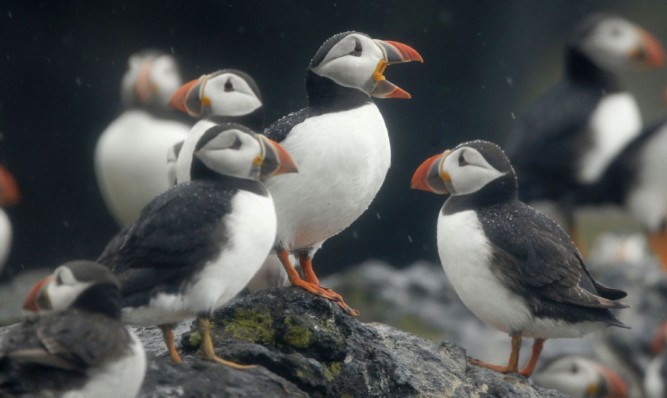Puffins are mistaking discarded plastic for food, according to new research.
Experts say the discovery of small plastic pellets, or nurdles, in the stomachs of the birds, often called the clowns of the sea, is far from a joke.
The nurdles, similar in size to a lentil, were found by the Centre for Ecology and Hydrology (CEH) in puffins collected on the Isle of May in the Firth of Forth.
Campaigners are now speaking to local companies that use plastics in a bid to keep the Forth nurdle-free.
Mark Newell from CEH said: “We regularly collect puffins found dead on the island to help us monitor the health of the population.
“As part of this research we look at what they have been eating.
“At first we didn’t know what the strange pieces of plastics were but we found them in a number of the puffins’ stomachs.
“When the Great Nurdle Hunt contacted us asking if we had found any small plastic pellets in the seabirds we were studying I realised they were nurdles.”
Nurdles are the plastic industries’ raw material and melted together they form nearly all the plastic products we use.
Accidental spills mean countless billions of these pellets now litter waterways around the world.
Scottish Seabird Centre chief executive Tom Brock said the fact puffins are ingesting nurdles is alarming.
He said: “Not only can nurdles get trapped in their stomach but the toxic chemicals on the surface of the plastic may have terrible repercussions.
“It is vital that we all do what we can to resolve this issue.”
Cathy Sexton of the Great Nurdle Hunt said there is a serious problem around the Forth with beaches littered with thousands of pellets.
“We have contacted the plastic companies around the Forth and using the public sightings shown them the impact nurdles are having on the local environment,” she said.
“I am pleased to say that as a result we are now in discussion with a number of those companies who are keen to help keep nurdles out of the Forth.
“However this discovery on the Forth’s National Nature Reserves is a disturbing and serious reminder of the effects nurdles are having on wildlife and the pressing need for industry to act to prevent more seabirds from being affected.”
* See more at www.facebook.com/nurdlehunt
